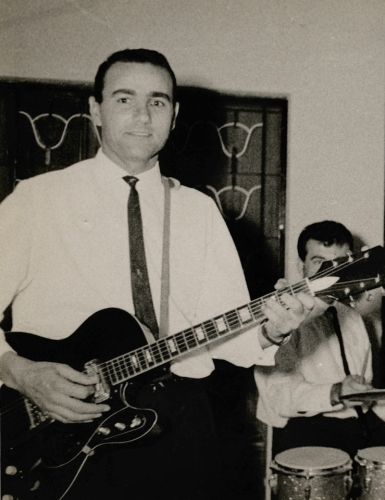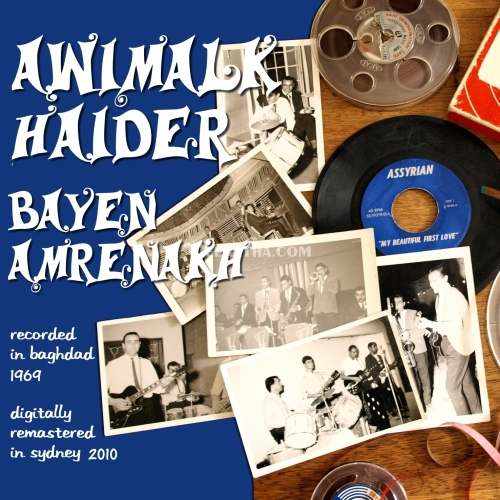Awimalk Haider
Details
- Artist Type
- Singer
- Website
- https://www.awimalkhaider.com
- Biography
-
In the 1950s and '60s, Baghdad was a city of jazz musicians, cabaret nightclubs, and a liberal middle class. Awimalk Haider grew up in this atmosphere, loving music, listening to Nat King Cole records. In his twenties, he studied classical guitar with the Iraqi Armenian composer and performer Loris Chobanian, who is now a celebrated composer and academic living in the USA. A stellar student, in 1958 Awimalk was invited to accompany his teacher in a televised concert.
Awimalk formed a band with some Assyrian friends, and calling themselves “the Pals” they performed covers of Western songs at parties and weddings.
Meanwhile, he was gaining a lot of attention in the Iraqi soccer fraternity as an invincible goalkeeper. Despite eventually becoming the most famous goalkeeper in Iraq, he was unable to earn a living from sport, as soccer was not funded in Iraq the way it was in Europe, and the Iraqi team rarely toured internationally. But Awimalk and his team-mates took pleasure in continuously beating the RAF team, which was stationed in the area and made up of professional English players.
Working a day job at the American Embassy in Baghdad, Awimalk had the chance to meet the American music stars such as Duke Ellington, who toured the Middle-East in the 1960s as “goodwill ambassadors”. The music scene was thriving in Baghdad, and Awimalk’s band was performing nightly in Baghdad’s cabaret nightclubs, as well as doing American and Assyrian functions. Although they played Western cover songs in the nightclubs, Awimalk was writing his own songs in Assyrian.
Between 1969 and 1970, Awimalk’s band recorded 5 original songs in Assyrian, at Baghdad’s Bashirphone Studios. The band was made up of Awimalk on vocals and guitar, Tamras on drums, Romeo Hanna on bass, Johnson Youkhana on piano and accordion, and blind musician Joseph Petros on violin.
They released two 7-inch singles. The first single (Bayen Amrenakh) was pressed in Iran, but a fragile political situation meant that few copies made it back to Iraq. The second single (Plitla Gu Aurkhi) was pressed in the USA, but only a small quantity were released.
Shortly after releasing Plitla, Awimalk migrated to Australia, where like most migrants at that time he focused on building a new life, working hard and buying a house, rather than pursuing a music career. The recent rediscovery of the original studio tapes of the Baghdad recordings now exposes Awimalk’s music to a worldwide audience.
In the 1950s and '60s, Baghdad was a city of jazz musicians, cabaret nightclubs, and a liberal middle class. Awimalk Haider grew up in this atmosphere, loving music, listening to Nat King Cole records. In his twenties, he studied classical guitar with the Iraqi Armenian composer and performer Loris Chobanian, who is now a celebrated composer and academic living in the USA. A stellar student, in 1958 Awimalk was invited to accompany his teacher in a televised concert.
Awimalk formed a band with some Assyrian friends, and calling themselves “the Pals” they performed covers of Western songs at parties and weddings.
Meanwhile, he was gaining a lot of attention in the Iraqi soccer fraternity as an invincible goalkeeper. Despite eventually becoming the most famous goalkeeper in Iraq, he was unable to earn a living from sport, as soccer was not funded in Iraq the way it was in Europe, and the Iraqi team rarely toured internationally. But Awimalk and his team-mates took pleasure in continuously beating the RAF team, which was stationed in the area and made up of professional English players.
Working a day job at the American Embassy in Baghdad, Awimalk had the chance to meet the American music stars such as Duke Ellington, who toured the Middle-East in the 1960s as “goodwill ambassadors”. The music scene was thriving in Baghdad, and Awimalk’s band was performing nightly in Baghdad’s cabaret nightclubs, as well as doing American and Assyrian functions. Although they played Western cover songs in the nightclubs, Awimalk was writing his own songs in Assyrian.
Between 1969 and 1970, Awimalk’s band recorded 5 original songs in Assyrian, at Baghdad’s Bashirphone Studios. The band was made up of Awimalk on vocals and guitar, Tamras on drums, Romeo Hanna on bass, Johnson Youkhana on piano and accordion, and blind musician Joseph Petros on violin.
They released two 7-inch singles. The first single (Bayen Amrenakh) was pressed in Iran, but a fragile political situation meant that few copies made it back to Iraq. The second single (Plitla Gu Aurkhi) was pressed in the USA, but only a small quantity were released.
Shortly after releasing Plitla, Awimalk migrated to Australia, where like most migrants at that time he focused on building a new life, working hard and buying a house, rather than pursuing a music career. The recent rediscovery of the original studio tapes of the Baghdad recordings now exposes Awimalk’s music to a worldwide audience.
Awimalk formed a band with some Assyrian friends, and calling themselves “the Pals” they performed covers of Western songs at parties and weddings.
Meanwhile, he was gaining a lot of attention in the Iraqi soccer fraternity as an invincible goalkeeper. Despite eventually becoming the most famous goalkeeper in Iraq, he was unable to earn a living from sport, as soccer was not funded in Iraq the way it was in Europe, and the Iraqi team rarely toured internationally. But Awimalk and his team-mates took pleasure in continuously beating the RAF team, which was stationed in the area and made up of professional English players.
Working a day job at the American Embassy in Baghdad, Awimalk had the chance to meet the American music stars such as Duke Ellington, who toured the Middle-East in the 1960s as “goodwill ambassadors”. The music scene was thriving in Baghdad, and Awimalk’s band was performing nightly in Baghdad’s cabaret nightclubs, as well as doing American and Assyrian functions. Although they played Western cover songs in the nightclubs, Awimalk was writing his own songs in Assyrian.
Between 1969 and 1970, Awimalk’s band recorded 5 original songs in Assyrian, at Baghdad’s Bashirphone Studios. The band was made up of Awimalk on vocals and guitar, Tamras on drums, Romeo Hanna on bass, Johnson Youkhana on piano and accordion, and blind musician Joseph Petros on violin.
They released two 7-inch singles. The first single (Bayen Amrenakh) was pressed in Iran, but a fragile political situation meant that few copies made it back to Iraq. The second single (Plitla Gu Aurkhi) was pressed in the USA, but only a small quantity were released.
Shortly after releasing Plitla, Awimalk migrated to Australia, where like most migrants at that time he focused on building a new life, working hard and buying a house, rather than pursuing a music career. The recent rediscovery of the original studio tapes of the Baghdad recordings now exposes Awimalk’s music to a worldwide audience.



